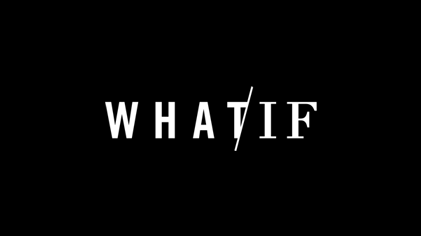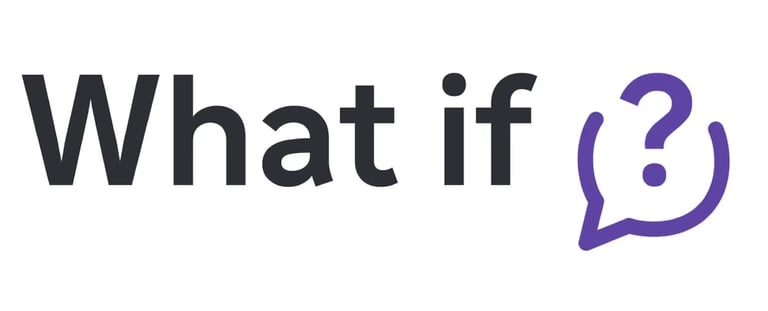
In a world of constant change, asking 'What if?' is not just a question but a survival strategy.


Great leaders ignite possibility by daring to imagine what could be, by asking "What If."


Moving Beyond the Why:
How "What if?" Fuels Innovation


Challenge Existing Norms (Why?):
Asking "Why?" helps challenge existing processes and assumptions. Instead of following routines because that's the way it's always been done, asking "Why" promotes a culture that digs deeper to understand the root cause of a problem or the purpose behind a process. This reflection often reveals outdated practices or inefficiencies that can be refined or removed, improving overall operations.
Simon Sinek introduced us to the Golden Circle and the fact that most companies know What they do, some know How they do it, but very few know Why they do it. This could apply to both companies and individuals. Now imagine what happens when we consistently ask "What if" after each question. The What if question signals a shift towards innovation, continuous improvement, and adaptability. This is essential because it invites curiosity, challenges assumptions, and opens pathways for creative problem-solving. By fostering a culture that encourages What if, companies can break free from stagnant practices, anticipate future trends, and identify new opportunities for growth.
Expand Horizons (What if?):
The question “What if?” fosters an environment of possibility, sparking creative thinking and out-of-the-box ideas. It encourages employees to imagine alternative scenarios, dream big, and consider paths that might seem risky but hold the potential for high rewards. These hypothetical scenarios allow teams to test boundaries, leading to breakthrough innovations that can transform the company.


Identify New Opportunities (What if?):
Consistently asking “What if?” after each"Why" can reveal overlooked opportunities in the market. For instance, “Why do our customers choose our competitors?” where the correct question should be, “What if we offered a product with a unique twist?” could help the company uncover customer pain points or unmet needs. The insights gained can then inform new product or service offerings that differentiate the company from its competition.


Adapt to Changing Markets (What if?):
By questioning the status quo and exploring new ideas, companies stay adaptable in rapidly changing environments. Asking “Why is this trend happening?” or “What if we responded by doing X?” can help companies pivot their strategies in response to emerging trends, ensuring they remain relevant and competitive.


Success Examples from Asking "What if"
Apple’s “What If We Created Something People Didn’t Know They Needed?”
When Apple considered the “What if?” question with the iPhone, they thought beyond existing smartphones and imagined a device that integrated a phone, music player, and internet communicator. This “what if” led to a product that redefined the smartphone category, making Apple a tech industry leader.Toyota’s Lean Manufacturing
Toyota’s production system includes a practice where employees ask “What if?” five times to understand the root cause of a problem. This approach has allowed Toyota to significantly improve its efficiency and reduce waste in its manufacturing processes, setting a benchmark for operational excellence.Netflix’s “What If We Made Our Own Shows?”
When Netflix transitioned from a DVD rental service to streaming, they asked, “What if we started creating original content?” This shift revolutionized the entertainment industry and transformed Netflix from a content distributor to a global content creator, setting a new standard for streaming platforms.Amazon’s “What if Customers Get their Shippment in a Day?”
Amazon’s obsession with customer experience led them to ask, “What if customers receive their orders in a day or less?” This questioning spurred innovations like Prime shipping, which redefined e-commerce standards and strengthened Amazon’s brand loyalty.SpaceX’s “What If We Could Reuse Rockets?”
SpaceX’s foundational “What if?”—“What if rockets could be reusable?”—challenged a long-standing assumption in aerospace. By tackling this question, SpaceX developed reusable rockets, drastically reducing the cost of space travel and opening doors for more frequent and affordable space missions.


Applying "What If" in Practice
To successfully integrate these questions into a company culture, leadership can:
Encourage team members to question processes, assumptions, and outcomes without fear of pushback.
Facilitate brainstorming sessions that prioritize “what if” scenarios.
Use methods like the 5 Whys for root cause analysis in problem-solving.
Recognize and reward employees who bring innovative ideas from asking these questions, even if the ideas are unconventional.
By embedding “Why” and “What if” into its culture, a company can cultivate resilience, adaptability, and foresight—three ingredients that are invaluable for long-term success in any industry.
Client Feedback
Hear what our clients say about our leadership and transformation talks.
The session on "What If" has helped my company culture change and allowed each employee to think outside the box to improve their process or work style. It really has motivated all the employees to start thinking like owners
Emily Davis
Los Angeles






